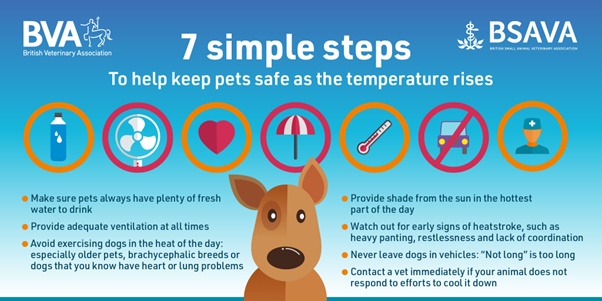Looking after pets during hot weather
Advice from the British Veterinary Association
Summer can be a wonderful time of the year, with time spent outside enjoying the sunshine and warmer weather. However, like us, our pets are also vulnerable to heat-related problems and illnesses. Each year, vets see pets suffering from heat-related conditions like heatstroke, breathing problems, burnt paw pads and sunburn. Dogs lead the pack in the number of cases vets see, followed by rabbits and cats.
Even on overcast or humid summer days, cars and spaces like conservatories can quickly heat up and our pets can be at risk of overheating.
If you're concerned about any animal, always speak to a vet as quickly as possible. Heat-related illnesses can be fatal but early intervention can save lives.
The British Veterinary Association has some top tips on how to keep our pets safe in hot weather.

Check access to water and shade
- Make sure that all pets, from dogs and cats to birds, rabbits and guinea pigs, always have access to fresh water to drink, adequate ventilation, and shade from direct sunlight.
- Never leave animals in cars, conservatories, outbuildings, or caravans on a warm day, even if it's overcast or just for a short while, as this can be fatal for them.
- Provide pets with a cool mat and fan and keep frozen water bottles covered in towels in their living space. For rabbits and guinea pigs, you can provide extra shade by covering the top of wire mesh runs with damp towels. Lightly misting rabbits’ ears with cold water is also an effective way to help cool them, as long as this doesn’t stress them.
- Don’t forget the wild animals that visit our gardens - keep out a bowl of fresh, clean water for wildlife such as birds and hedgehogs.
Keep dog walks to cooler times of the day
- Dogs won’t stop playing and running if it is hot, so it’s up to owners to take action to prevent them overheating. This includes making sure they aren’t walked or exercised in the middle of a hot day. Stick to early morning or late evening walks when its cooler.
- Breeds such as English or French bulldogs and pugs are at greater risk in summer. Their flat faces can make breathing difficult, and they struggle to cool down by panting, which is the main way for a dog to reduce its body temperature. Take extra care when walking flat-faced breeds, older or overweight dogs, and dogs that you know have heart or lung problems.
- Do the five-second tarmac test before taking a dog out for a walk: if it feels too hot for your hand, it’s too hot for your dog’s paws.
Never leave animals in cars or conservatories
- Never leave your pet inside a car or conservatory, even for a quick trip to the supermarket, as ‘not long’ can prove fatal. Leaving the car windows open and a bowl of water is not enough.
- If you see a dog in distress in a hot car, it is best to dial 999 and report it to police.
Protect against sunburn
- It’s not just people that need to protect themselves from sunburn. Some breeds of cats and dogs, particularly those with light-coloured or finer fur, may also benefit from it.
- Apply a 30 SPF (or above) pet-safe sun cream, especially on the ear tips and noses, which are prone to sunburn. Ask your vet for advice if you have any questions about this.
Check for flystrike
Flystrike is a life-threatening risk for rabbits and guinea pigs in the warmer months. Check their bottoms twice a day to make sure they are clean and to spot any early signs of fly eggs or maggots. A 'sticky bottom' is not only at much higher risk of flystrike, but it may also be due to a problem with your rabbit's teeth or digestion. Flystrike is an emergency with rapid deterioration so if in any doubt call your vet straight away. Speak with your vet for advice on how reduce the risk of flystrike.
For more tips and advice on taking care of your pets during hot weather, visit the British Veterinary Association’s website.


